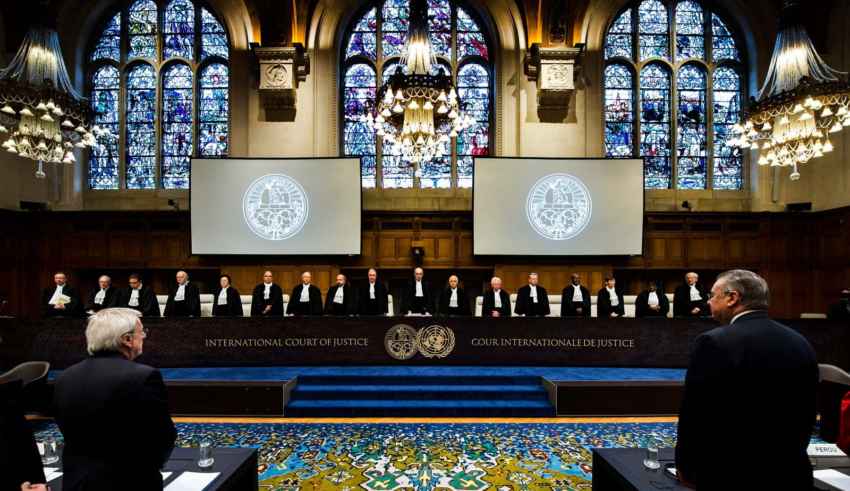
The International Court of Justice was established in 1945 to resolve legal disputes brought to it by Member States in accordance with international law, and to provide advisory opinions on legal problems referred to it by authorized United Nations organs and specialized agencies. Impartiality and political neutrality are supposed to be the ICJ’s main objectives. As the principal judicial organ of the United Nations, the ICJ is responsible for ruling independently and according to international law, not certain nations’ political interests. Furthermore, the ICJ’s judgments are final, binding on the parties to a case and without appeal, but the Court has absolutely no enforcement powers other than the ability to negotiate the reparations required for agreement non-compliance.
The ICJ is funded through the regular budget of the United Nations. The four largest contributors to the United Nations – the US (22% of the UN budget), China (12.005%), Japan (8.564%) and Germany (6.090%) – fund some 49% of the total UN budget. In any internationally-funded organization, the more funding the state provides, the greater power it has over the decision- making process. That might not be as problematic for the UN as it is for the ICJ. As the world’s highest court, the ICJ is expected to remain fair and impartial. Contrary to popular belief, it is not a moral issue; rather, it is a matter of authority.
If the leading world powers want to continue utilizing the ICJ as a tool to promote their interests, it is critical to maintain the Court’s image. For instance, on March 16, 2022, the ICJ ordered that Russia cease hostilities in Ukraine, launched on February 24, 2022. First, Russia had refused to defend itself in court in The Hague. That fact demonstrates the Russian disregard toward the ICJ and its authority. Then, Russia entirely ignored the ICJ’s provisional measures, therefore rendering that ruling essentially worthless. One factor for Russia’s response is likely the belief that the ICJ is under the U.S influence and that Russia would not receive a fair hearing. In today’s world, that notion seems very realistic because the world appears to have already decided who is at fault in the Russo-Ukrainian war. Some political influence cannot be avoided and could even be beneficial sometimes. However, it is not acceptable for the ICJ to be led by political interests of some nations. If this trend continues, the international community risks additional countries refusing to obey the ICJ’s judgements, rendering the Court ineffective.
It is critical to understand the difference between the international law and international affairs. At this point, the ICJ judges and their biases enter the picture. According to the study conducted by the University of Chicago, there is strong evidence that (1) judges favor the states that appoint them and that (2) judges favor states whose wealth level is close to that of the their own states, and weaker evidence that (3) judges favor states whose political system is similar to that of their own states and that (4) (more weakly) judges advocate for states whose culture (language and religion) is similar to that of their own states. Judicial bias is problematic for a number of reasons. First, there are issues of predictability and reluctance. If a certain state can predict that the ICJ will rule against it based on the judges and their affiliations, that state is less likely to bring an action to the Court. As a result, some disputes may take longer to resolve, severely impacting the international community. Additionally, the disputing nations may opt to take matters into their own hands and seek to resolve disagreements by armed means. For instance, Russia claims that, according to the Minsk-2 Agreement, Ukraine agreed not to attempt to join NATO. Ukraine and the United States do not view the agreement’s terms in that manner. Hence, there is a question of international contract interpretation, and the ICJ would be the Court to address that issue. However, Russia decided not to file a case with the Court and instead launched a military attack on Ukraine. One of the reasons for that decision was likely the prediction of judicial bias and an unfavorable ruling by the ICJ. If more countries follow Russia’s lead, the international community will face a global humanitarian catastrophe. That is why an impartial and fair court is necessary, so that nations may bring their issues there rather than to the battlefield.
The ICJ’s lack of enforcement powers is another obstacle to international justice. For example, in 2018, the ICJ ordered the U.S to ensure its sanctions do not hit humanitarian aid or civil aviation safety for Iran. The Donald Trump administration rejected the Court’s ruling arguing lack of jurisdiction and politicized nature of the ICJ. In general, the ICJ’s jurisdiction is limited to the consent of the countries involved in a dispute. This is troubling because any nation may reject the Court’s jurisdiction without incurring serious consequences. Furthermore, it undermines the ICJ’s prestige by creating the impression that the Court is a powerless pawn. The United States, China, Japan, Russia, and other nations have all defied the ICJ’s judgements. Once again, that behavior is extremely dangerous for the international community and the global powers because it is likely to disrupt the world order.
References
Couzigou, I. (2017). Enforcement of UN Security Council resolutions and of ICJ Judgments. Oxford Scholarship Online. https://doi.org/10.1093/acprof:oso/9780198746560.003.0022
Posner, E. A., & de Figueiredo, M. (2005). Is the International Court of Justice Biased? SSRN Electronic Journal. https://doi.org/10.2139/ssrn.642581
Turak, N. (2018, October 5). US rejects International Court of Justice ruling on Iran, continuing its isolationist charge. CNBC. Retrieved May 10, 2022, from https://www.cnbc.com/2018/10/05/us-rejects-international-court-of-justice-ruling-on-iran-continuing-its-isolationist-charge.html
By The European Institute for International Law and International Relations.















